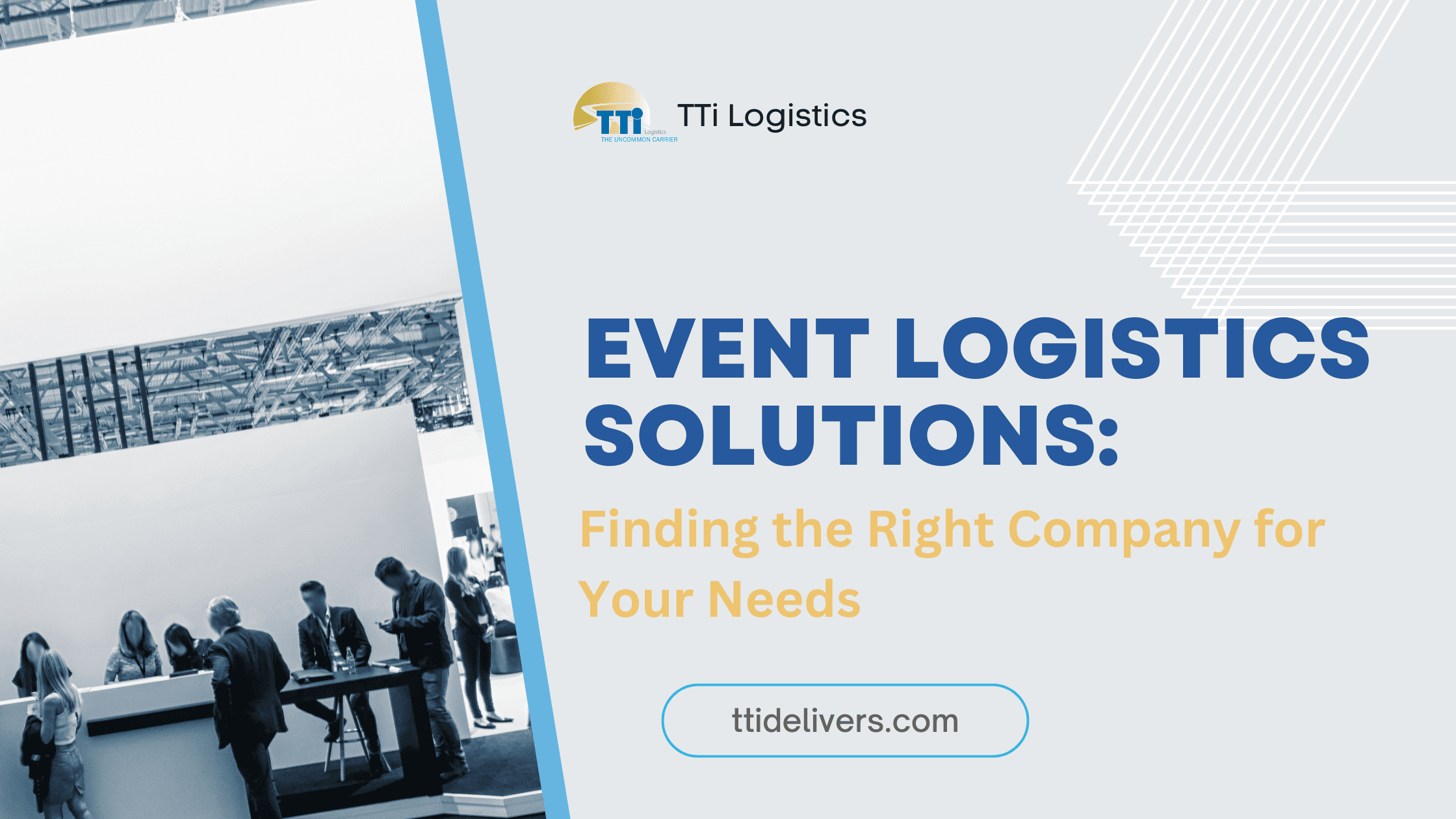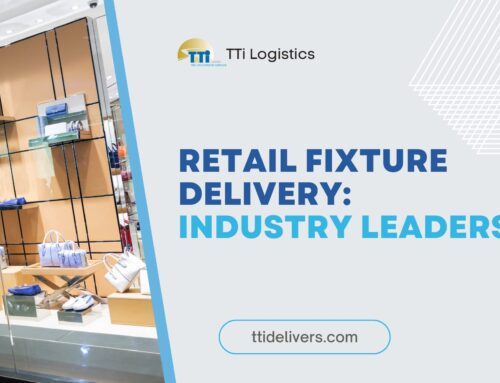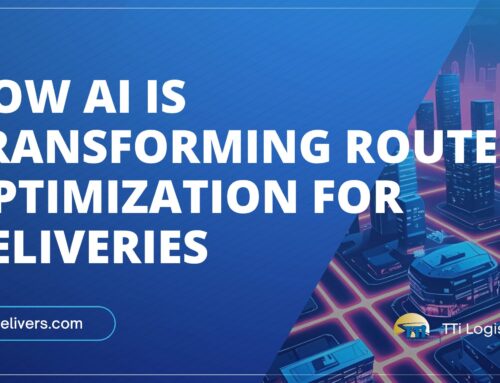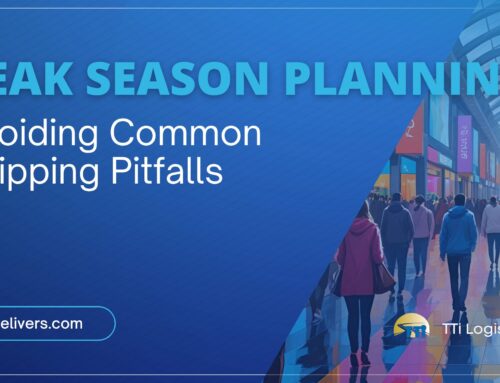Seamless Event Execution Starts with the Right Logistics Partner
Planning and executing a successful event requires meticulous attention to detail and flawless coordination. From corporate conferences to music festivals, the logistics behind these gatherings are complex and multifaceted. Every aspect—from venue selection to transportation, catering, and equipment setup—must be carefully managed to ensure a seamless experience for attendees. This is where event logistics solutions play a crucial role.
In today’s fast-paced world, event organizers often rely on professional logistics companies to handle the intricacies of event planning and execution. These companies specialize in coordinating all aspects of an event, allowing organizers to focus on other critical tasks. However, with so many options available, finding the right logistics partner can be a daunting task.
In this blog post, we’ll explore the key factors to consider when choosing an event logistics company and how TTi Logistics stands out in this competitive industry.
Understanding Event Logistics
Before delving into the process of selecting an event logistics company, it’s essential to understand what event logistics entail. Event logistics encompass the planning, organization, and execution of all activities related to an event. This includes:
1. Venue Selection and Management:
- Choosing the right venue is crucial to the success of any event. Event logistics companies help identify suitable venues based on the event’s requirements, capacity, and audience demographics. They negotiate contracts on behalf of the organizer to secure the best possible terms and conditions, ensuring a smooth partnership from the outset.
- Venue management involves not only securing the space but also coordinating with venue staff regarding layout options, catering requirements, and technical support. This coordination ensures that all logistical details are accounted for well in advance, minimizing potential disruptions on the event day. A proactive approach can include arranging for rehearsal times, technical checks, and final walkthroughs to ensure everything is in place.
- Accessibility Considerations: It’s vital to evaluate the accessibility of the venue. A logistics company can help ensure that the venue accommodates all attendees, including those with disabilities, by providing ramps, designated seating, and accessible restrooms. Ensuring accessibility is not just a legal requirement but also enhances the overall attendee experience. A well-chosen venue that considers accessibility can significantly increase attendee satisfaction and engagement. Furthermore, logistics teams can implement assistive technologies, such as hearing loops or mobile app guides, to further enhance inclusivity.
2. Transportation and Travel Arrangements:
- Coordinating transportation for attendees, speakers, and staff is a logistical challenge, especially for large-scale events. Logistics companies handle all travel arrangements, including flights, ground transportation, and accommodation, ensuring seamless arrivals and departures. This involves booking group rates with airlines and hotels, which can lead to cost savings for the organization.
- Efficient travel logistics also encompass managing shuttle services for large groups, ensuring that all transportation schedules align with the event itinerary. This includes setting up a user-friendly system for attendees to access transportation details, track shuttles in real-time, and communicate any changes that may arise.
- Customizing Travel Packages: Logistics companies can offer tailored travel packages that meet the needs of different attendee profiles. For example, VIP guests may require specialized transportation options, while general attendees might prefer more economical choices. This flexibility can enhance the attendee experience and demonstrate the organizer’s commitment to catering to diverse needs.
3. Catering and Food Services:
- Food and beverage services can significantly impact attendee satisfaction. Event logistics companies work closely with catering teams to design menus that cater to various dietary preferences and restrictions, such as vegetarian, vegan, gluten-free, and allergen-free options. This attention to detail ensures that all guests feel included and valued.
- Logistics teams can also manage the timing of food service to ensure that meals are served fresh and at appropriate times throughout the event. This includes coordinating with kitchen staff, arranging for adequate serving equipment, and planning for proper disposal of waste to maintain cleanliness and organization during the event.
4. Equipment and Resource Management:
- From audiovisual equipment to staging, lighting, and decor, events often require a myriad of resources. Logistics companies source and manage these resources, ensuring they are delivered and set up according to the event schedule. This involves meticulous inventory management, where logistics teams keep track of all equipment and materials needed for the event.
- Technical Support: Providing technical support during the event is essential for ensuring that presentations run smoothly and that all technical equipment functions as expected. Logistics companies often have technicians on-site to troubleshoot any issues that arise, which can prevent minor problems from escalating into major disruptions.
5. Vendor Coordination:
- Events often involve multiple vendors, such as caterers, entertainers, and technical support teams. Coordinating these vendors and ensuring they deliver their services on time and to the desired standard is a critical aspect of event logistics. A logistics company serves as the central point of communication among all vendors, helping to streamline processes and clarify expectations.
- Establishing clear timelines and responsibilities for each vendor is crucial. Logistics providers can create detailed schedules that outline when each vendor should arrive, what tasks they need to complete, and when their services will be needed. This proactive approach helps avoid confusion and ensures that everyone is aligned toward a common goal.
6. On-Site Coordination:
- On the day of the event, logistics companies oversee all aspects of setup, coordination, and troubleshooting to ensure everything runs smoothly. This includes managing staff, addressing last-minute changes, and ensuring that all components are in place. Event coordinators are often the first responders to any unexpected challenges that may arise, such as weather changes for outdoor events or equipment malfunctions.
- Post-Event Evaluation: After the event concludes, logistics companies often conduct a thorough evaluation of the entire process. This includes gathering feedback from attendees, organizers, and vendors to assess what worked well and what could be improved for future events. Such insights are invaluable for refining logistics strategies and enhancing the overall quality of future events.
Choosing the Right Event Logistics Partner
When selecting an event logistics company, it’s essential to consider several key factors:
- Experience and Expertise: Look for a logistics partner with a proven track record in handling events similar to yours. Their experience in managing logistics for a variety of events will help ensure that they can navigate any challenges that arise.
- Flexibility and Customization: A good logistics provider should be able to tailor their services to meet your specific needs. Whether you’re planning a small corporate retreat or a large music festival, they should be able to adapt their offerings accordingly.
- Reputation and Reviews: Research potential logistics companies by reading reviews and testimonials from past clients. A reputable company will have a history of satisfied clients and successful events.
- Technology and Tools: In today’s digital age, a logistics partner that utilizes the latest technology for tracking, communication, and planning can greatly enhance the efficiency of your event. Look for companies that offer real-time tracking tools and communication platforms for seamless coordination.
- Cost Transparency: Ensure that the logistics company provides clear pricing and is transparent about all potential costs involved. This can help avoid unexpected expenses and keep your budget on track.
- Communication: Effective communication is vital in event logistics. Choose a partner that emphasizes clear and open communication throughout the planning and execution phases. This will help to ensure that all parties are on the same page and that any issues can be quickly addressed.
Partnering for Success: Elevate Your Events with Expert Logistics
Choosing the right event logistics solutions provider can make a significant difference in the success of your event. By understanding the complexities of event logistics and considering the factors outlined in this guide, you can make an informed decision that enhances the overall experience for your attendees.
TTi Logistics is dedicated to providing comprehensive, customized solutions that ensure your event runs smoothly from start to finish. With their expertise and commitment to excellence, you can trust them to deliver exceptional logistics support, allowing you to focus on what matters most—creating a memorable event.







